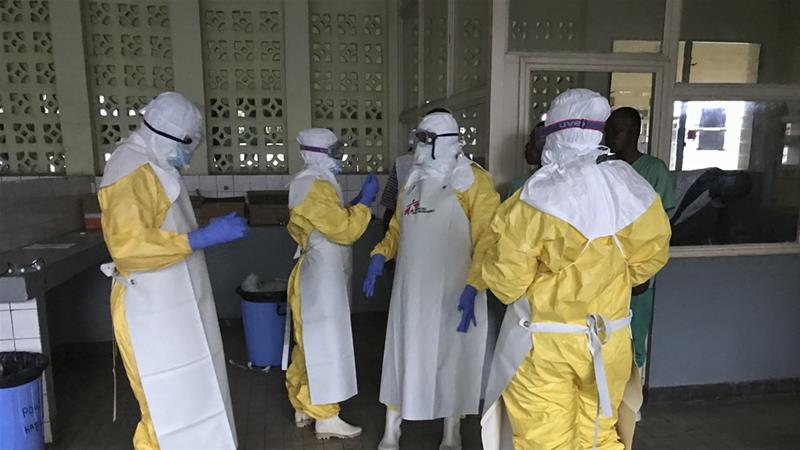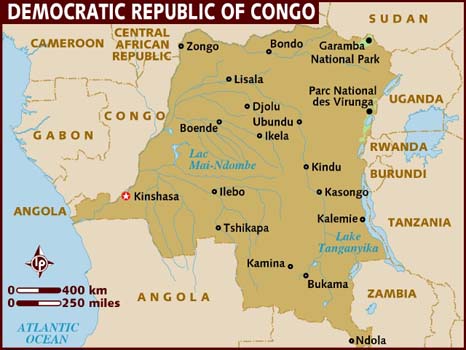DRC struggles to fight Ebola outbreak
November 20, 2018 | Expert Insights

Efforts to fight Ebola in Beni are hindered after a deadly act of violence by the Allied Democratic Front (ADF).
However, the World Health Organisation says that despite deadly attacks, Ebola response activities are continuing.
Background
The Ebola Virus Disease (EVD) is a severe illness in humans. The approximate case fatality rate is 50%. The first outbreaks of Ebola occurred in 1976 in remote Central African villages, near tropical rainforests. The Democratic Republic of Congo was one of the first places where the disease was identified. The small Yambuku village, the centre of one of the first outbreaks, is located near the Ebola River, from which the disease gets its name.
The Democratic Republic of Congo (DRC) has over 10 recorded instances of Ebola outbreaks, dating back to the 1970s. the Ebola disease itself was named after the Ebola river which flows in Central DRC.
The Allied Democratic Forces (ADF) is an Islamist-rooted group that rose in western Uganda in 1995, led by Jamil Mukulu, a Christian turned Muslim. Forced out of Uganda, it operates in the border area in the DRC’s North Kivu province.
In Beni, the ADF has a brutal reputation. It is blamed for hundreds of civilian deaths over the past three years, as well as mass rape and child soldier recruitment. Fifteen other peacekeepers were killed in an ADF assault on a MONUSCO base in Beni in December 2017.

Analysis
Health authorities in the Democratic Republic of Congo (DRC) have resumed efforts to fight a major Ebola outbreak in eastern Beni region after a brief suspension following clashes. "Despite deadly attacks .. Ebola response activities are continuing," the World Health Organization (WHO) said on Sunday.
Health Minister Oly Ilunga Kalenga had announced the suspension of operations on Saturday, a day after clashes broke out a "few metres" away from a local emergency centre and the hotels of several response teams in Beni, North Kivu province.
Peacekeepers from the United Nations' mission in the country (MONUSCO) have repelled an offensive by the Allied Democratic Forces (ADF) militia in the city's northern Boikene neighbourhood late on Friday. Seven Malawian and one Tanzanian peacekeeper were killed in the attack. The World Health Organization (WHO) also said 16 of its staff members had been temporarily evacuated to Goma for psychological care after a shell hit the building they were staying in. Michel Yao, the WHO's coordinator for Ebola response operations in Beni, told the AFP news agency that no one was wounded, adding that it was not known whether the shell came from the ADF or MONUSCO forces.
"WHO will continue to work side-by-side with the ministry and our partners to bring this Ebola outbreak to an end," WHO chief Tedros Adhanom Ghebreyesus said in a statement. "We honour the memory of those who have died battling this outbreak, and deplore the continuing threats on the security of those still working to end it," he added.
The United Nations also resumed activities, including vaccination, the UN health agency said in a statement.
The latest Ebola outbreak, the country's 10th, has caused 166 confirmed and 47 probable deaths, mostly in the mineral-rich North Kivu and Ituri provinces, that have been the epicentre of interethnic and militia violence for decades.
According to the WHO, a total of 358 confirmed and probable cases have been reported in the country. The figure exceeds the 318 cases documented in 1976, when the virus was first identified in Yambuku, in the Equateur province.
Assessment
Our assessment is that DRC is facing two major threats: the ADF and a growing Ebola outbreak, both of which can heavily disrupt local economies and the Congolese society. We believe that DRC needs more external support in order to quell the rising Ebola outbreak. We also feel that if the Ebola outbreak spreads to the eastern reaches of the country, the conflict could hinder treatment, and aggravate the spread of the disease.
Read more:








Comments